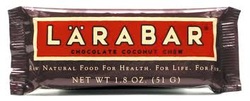|
During my Enterprise and Venture Initiation class at UCLA Anderson, we heard a really "delicious" story of the founding and sale of Larabar. The founder Lara Merriken came to speak to us, and it didn't hurt that she brought free samples.
Here are some of the most memorable takeaways and key points from her story. On inspiration Lara got the idea for her product in the spring of 2000 while hiking. She calls it her "intuitive moment" when she hungered for a healthy and delicious snack bar made of all natural ingredients. The rest is history. On starting Lara set out on a mission to create her signature bar with only six ingredients with household names: real fruit, nuts, and spices -- raw, vegan, and gluten-free. She was able to strike the perfect balance between health and taste and sustain it to reaching $20 million in sales in 2006. The day after she got the idea, she bought a Cuisinart and started experimenting at home. She even did some "customer development" from the beginning: she brought test batches to her friends and got great feedback; people starting asking her to buy them from her when they didn't get enough samples. When she made her first packaging, she realized she needed a name. No one could come up with a good name, and her friends already identified the bars with her personality, so they just said she should name it after herself. That's when Larabar was born. The first 500 bars were all made by hand. By 2003, they got the bars into a few Colorado stores and were delivering each batch themselves, handmade in Lara's kitchen by her staff of friends. Her first hire was her dad as COO, and she hired others whose titles were "do anything" (from shipping to answering phones to baking). Lara raised $150,000 from friends and family by word of mouth. She sent a simple business plan to people who helped her test the product, and she cared about having investors who believed in the idea for the long run. On expansion As they expanded to selling 40-50 million bars per year, they established numerous manufacturing partnerships and networks. In doing this, quality were her top priority. There was even a time when one batch of their bars got contaminated and a customer complained of finding something non-edible inside the bar. Lara talked to the customer personally, admitted fault, and pulled an entire batch from the shelves, being upfront with her customers and working hard to prevent this from occurring again. When Lara started selling at Whole Foods and other larger retailers, she personally did the sales in the aisles and got feedback from real shoppers. She found it critical to negotiate with Whole Foods so that she could control the distribution of her product for quality purposes, and she managed to do this as her bar was the only one of its kind at the time and selling out continuously. On perseverance Her biggest challenges at the start were finding manufacturers and persuading suppliers that her business was viable. She explained how it took tremendous faith and luck to get through some of those tough times when deals fell through or quality issues came up. Her advice to entrepreneurs is to "stay true to your vision, surround yourself with people who support you, don’t fear risks, and persevere because anything is possible and you can make it happen.” On selling Lara was approached numerous times about selling her business. When she decided she would entertain the idea, she flew out to meet with two companies. One company treated her almost disrespectfully, showing little hospitality and not giving her a sense of trustworthiness and passion for her business. This company, though, was offering her more money than the other company's offer. The other company -- General Mills -- took a different approach. They showered her with lavish hospitality, including an entire banquet table of healthy foods upon her arrival and a lot of passion for her business and her vision. She immediately felt at home and understood -- that this company "got" her essence and was on board to take it to the next level. She ended up selling of course to General Mills in 2008, which has allowed her to continue to be involved with shaping the product's trajectory but has taken care of expanding distribution and running day to day operations. Conclusion Overall, I greatly enjoyed hearing Lara's story, and I liked how she stayed true to her ideals and ethics throughout the growth of her business.
2 Comments
Tom
10/23/2013 05:50:46 pm
She sold out to a huge conglomerate that is anti- consumer; they have contributed to defeat truth-in-labeling legislation!!
Reply
Howard
7/14/2022 10:23:09 am
So True!
Reply
Your comment will be posted after it is approved.
Leave a Reply. |
Archives
June 2024
Categories
All
Subscribe |

 RSS Feed
RSS Feed
